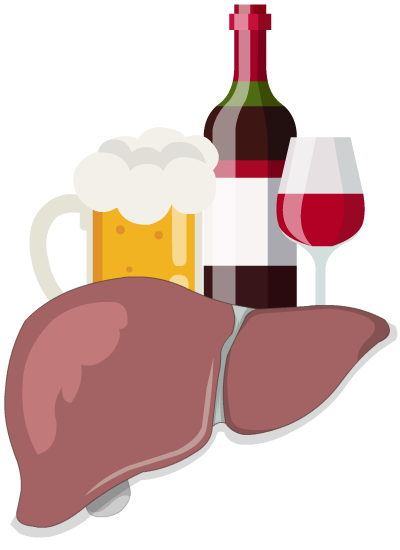Alcohol & the Liver
 The liver processes everything a person ingests, including alcohol. It can only detoxify so much alcohol at a time. If the liver is overwhelmed, excess alcohol can affect the brain, heart, muscles, and other tissues of the body. Daily consumption of alcohol as well as binge drinking (e.g., heavy drinking on weekends) can be particularly harmful to your liver. Any type of alcohol including hard liquor, beer, or wine, can damage the liver.
The liver processes everything a person ingests, including alcohol. It can only detoxify so much alcohol at a time. If the liver is overwhelmed, excess alcohol can affect the brain, heart, muscles, and other tissues of the body. Daily consumption of alcohol as well as binge drinking (e.g., heavy drinking on weekends) can be particularly harmful to your liver. Any type of alcohol including hard liquor, beer, or wine, can damage the liver.
When the liver has too much alcohol to handle, normal liver function may be interrupted. Over time, liver cells may be altered or destroyed. Alcohol-related liver disease is divided into three types. All three types can occur in one person at the same time.
- Alcohol related fatty liver disease. Anyone who drinks alcohol heavily will develop a condition in which liver cells are swollen with fat and water. This is called alcoholic fatty liver disease.
- Alcohol associated hepatitis. Heavy drinking can also lead to inflammation in the liver, called alcoholic hepatitis. Advanced alcoholic hepatitis can result in serious illness including death. This may occur before or after cirrhosis develops. Patients with alcoholic hepatitis have symptoms such as fatigue, poor appetite, jaundice (yellowing skin or eyes), or even fever. They are generally hospitalized.
- Alcohol related cirrhosis. This is advanced scarring of the liver, usually caused by years of drinking alcohol.
For people with chronic liver diseases such as hepatitis B, hepatitis C, or fatty liver disease, alcohol increases damage to the liver. It speeds up the development of cirrhosis.
Diagnosis
You may have advanced liver disease before you notice any symptoms. By then, it might be too late to do anything about it. So, it’s important to see your doctor and be honest about how much alcohol you drink. Through regular physical exams and blood tests, your doctor will be able to detect early signs of liver damage from alcohol.
Treatment
 Anyone with liver disease should NOT drink alcohol.
Anyone with liver disease should NOT drink alcohol.
Some people can improve their livers if they stop drinking entirely—even those who have already developed cirrhosis. When there’s no alcohol in the bloodstream, the liver cells are able to recover. The liver has a tremendous capacity to regenerate itself. In the majority of people who stop drinking alcohol, there’s a slow but noticeable improvement in how well their liver functions. If you choose to drink alcohol, less alcohol is best.
Nevertheless, for a few people, damage may be irreversible. There may be major health consequences or even death. The sooner alcohol is eliminated, the better the chance for recovery.
Note: The above sections were adapted (with permission) from content on the website of the Canadian Liver Foundation.
Get Support
It can be hard to cut down or quit drinking. Get support from people who care about you and want to help. Ask your family and friends to help you reach your goal. Talk to your healthcare provider if you’re having trouble cutting down.
There are also other resources to help you. Alberta’s Addiction Helpline is a toll-free, confidential service. The helpline can refer you to local support services related to addiction to alcohol.
Alberta’s Addiction Helpline 1-866-332-2322.
Use a Change Plan and Drinking Diary
One way to make any kind of change in your behaviour is to come up with a change plan. In the plan, list the goals you’d like to achieve. Outline the steps and challenges you’ll meet in reaching those goals, and figure out ways to overcome those challenges.
To keep track of how much you drink, use a drinking diary. Each day, record the number of drinks you have. At the end of the month, add up the total number of drinks you had each week.
Tips for Cutting Back
- Watch it at home. Keep no alcohol at home or only a small amount. Don’t keep temptations around.
- Drink slowly. When you drink, sip it slowly. Take a break of one hour between drinks. Drink water or non-alcoholic drinks after each drink with alcohol. Don’t drink on an empty stomach! Eat food when you’re drinking.
- Take a break from alcohol. Pick a day or two each week when you will not drink at all. Then, try to stop drinking for one week. Think about how you feel physically and emotionally on these days. When you succeed and feel better, you may find it easier to cut down for good.
- Learn how to say no. You don’t have to drink when other people drink. You don’t have to take a drink when it’s offered to you. Practice ways to say no politely. For example, you can tell people you feel better when you drink less. Stay away from people who give you a hard time about not drinking.
- Stay active. What would you like to do instead of drinking? Use the time and money you’d normally spend on drinking to do something fun with your family or friends. Go out to eat, see a movie, or go for a walk.
- Watch out for temptations. Watch out for people, places, or times that make you want to drink. Stay away from people who drink a lot, and avoid bars. Plan ahead of time what you will do to avoid drinking when you’re tempted.
- Don’t drink to cope with negative emotions. Don’t drink when you’ve had a bad day or you’re angry or upset. This is a habit you need to break if you want to drink less.
- Don’t give up! Most people don’t cut down or give up drinking all at once. Just like going on a diet, it’s not easy to change. This is okay. If you don’t reach your goal the first time, try again. Don’t give up! It will get easier.
Note: Much of this section was adapted from a handout by the National Institutes of Health last updated May 28, 2001.
References:
The information on this page was adapted (with permission) from the references below, by the Cirrhosis Care Alberta project team (physicians, nurse practitioners, registered nurses, registered dietitians, physiotherapists, pharmacists, and patient advisors).
This information is not intended to replace advice from your healthcare team. They know your medical situation best. Always follow your healthcare team’s advice.
References:
